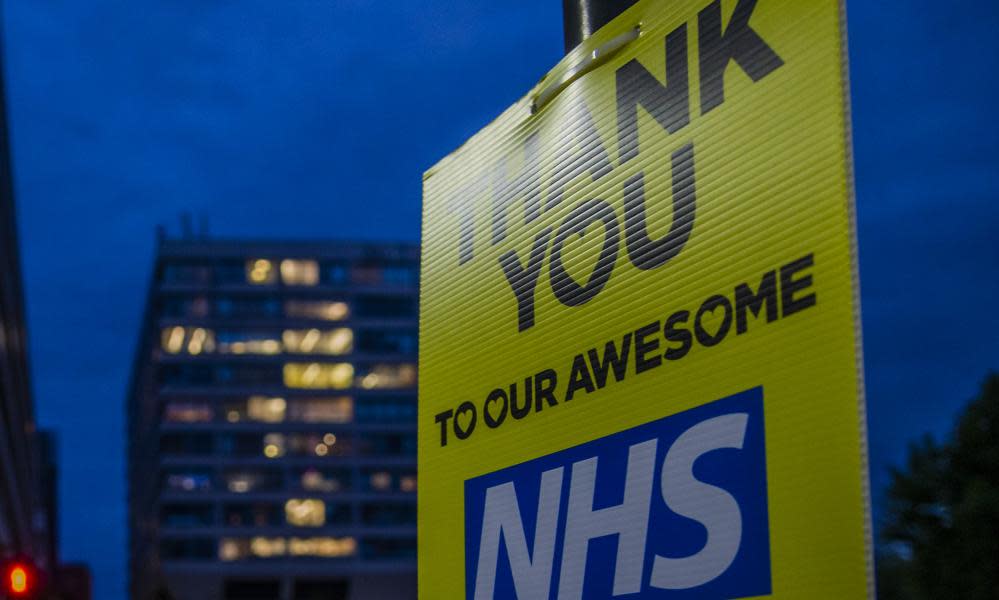'We give patients their voices back': the speech therapists on the Covid-19 frontline

I lead a group of NHS speech and language therapists at St Thomas’ hospital in London. I decided to become a speech and language therapist because the job is so varied. But I never thought it would lead me to the centre of a pandemic.
My profession is often misunderstood and the name doesn’t do justice to everything we do. Our role in the response to Covid-19 has been vital; we have been in the thick of it, treating patients with coronavirus in intensive care units (ICUs).
Related: I'm a physiotherapist. Seeing the impact of Covid on survivors will haunt me forever
We are there as patients are woken up after being ventilated. The look of terror in their eyes is easy to see. The tube that has been down their throat to keep them breathing has been replaced by another, a tracheostomy, and they can’t say anything. They are frightened. Often they don’t realise what is going on. They may have come in to hospital with coronavirus feeling a bit unwell and then gone downhill very quickly. There are no relatives with them and they’re surrounded by people in full personal protective equipment (PPE) who look like Martians.
Our job is to help patients in critical care who have difficulty swallowing and eating, and who need help weaning from tracheostomy tubes. The bread and butter of what my team does is helping people return to eating and drinking. A huge number of patients who are ventilated lose the ability to swallow safely. When that happens, food and drink go into lungs instead of the stomach; it’s a big cause of pneumonia and death.
We also help people to communicate and establish a voice. Sometimes when they wake up and have a tracheostomy tube in, we’ll give them a whiteboard to write things on, or we’ll use charts with letters and pictures they can point to. When the tube comes out, swelling in their throat or damage to the voice box means they can’t speak. We give people therapy to get their voice back.
We knew Covid-19 was coming, but it still seemed to happen overnight. In March, the first British super-spreader was treated at the hospital and within a couple of weeks, we were treating patient after patient with coronavirus. We had to respond very quickly and upskilled people to get them able to work with the patients we were seeing. Normally we would only see a few tracheostomy patients a week, but it didn’t take long before every patient we saw had one. We have a massive ICU and tripled our number of beds to meet the need. We were very busy.
I’m so proud of my team for their role in the coronavirus crisis. With the right care, a lot of patients have recovered quite quickly and have been eating and drinking within a few days. We’ve also been helping people have discussions with the wider healthcare team and their families. One of my team witnessed a marriage proposal over a video call, while others have been there when a patient has been able to talk to their partner for the first time since being sedated. That’s been possible because of the work my team has done.
But everyone is now facing burnout. Wearing PPE constantly is exhausting, hot and sweaty. At first, the adrenaline was pumping and people rallied round. Everyone felt buoyed by the clapping. Since then, the number of Covid-19 patients has declined but the virus is still around. We treat everyone as if they might have it and we have to be on alert for a second wave. That’s the hard bit. It feels like now should be the time when the B-team comes in and gives everyone time off to regroup but we all have to keep going. We’re in masks all day long. That’s our new reality and it’s really difficult.
We get trains home and see people who are not wearing masks or social distancing. Perhaps the public is fatigued from being on high alert and maybe it’s not realistic to expect people to live under the cloud of restrictions. We in the hospital still have to, however.
Related: Sign up for Society Weekly: our newsletter for public service professionals
We’ve helped patients who could barely swallow their own saliva be able to go home, eat and drink and communicate with family. That is our achievement and we need to carry on. At the same time, it’s frightening because there are still deaths every day. We face going into winter knowing that we normally have an increase in patient referrals with winter bugs and Covid-19 will be added into that mix.
What I have really learned through this is the strength of the team I work in is everything. We have become a work family; our debriefing sessions and a wellbeing hour have been cathartic and we have had excellent support from our colleagues in psychology. As we can’t see where we’re going or know when it will end, maybe it’s about celebrating how far we have come.
If you would like to contribute to our Blood, sweat and tears series about experiences in healthcare during the coronavirus outbreak, get in touch by emailing sarah.johnson@theguardian.com

 Yahoo News
Yahoo News 
